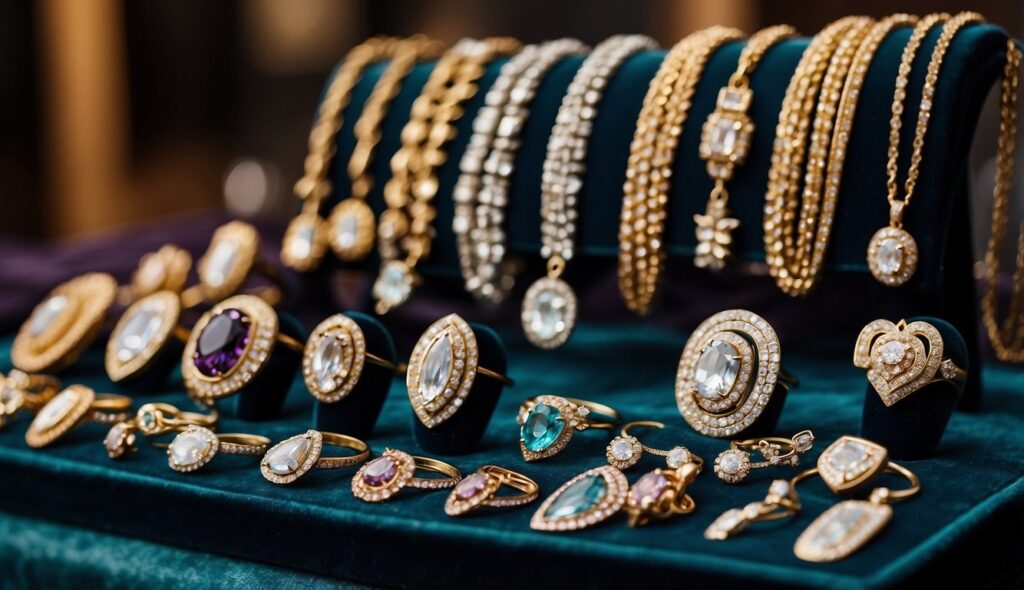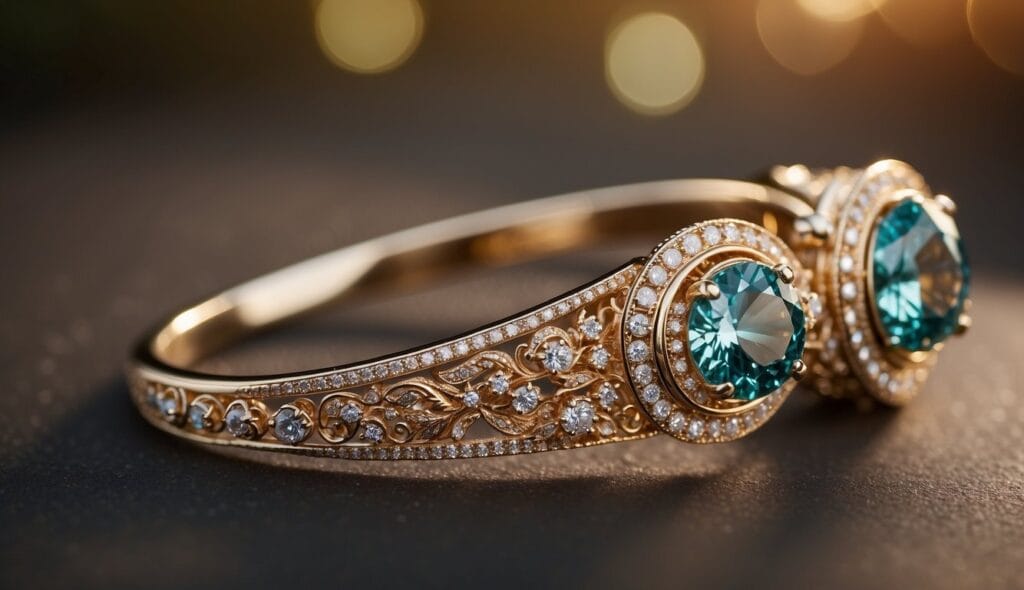When it comes to the sparkling world of decorative adornments, you might find yourself questioning the correct spelling—is it ‘jewellery,’ ‘jewelery,’ or ‘jewelry’? This common conundrum is rooted in the variations between British and American English.
While ‘Jewellery’ is the standard spelling in British English and is favoured across many other English-speaking countries, ‘Jewelry’ is predominantly used in American English. The less common “Jewelery” is often considered a misspelling.

Key Takeaways
- Correct spelling of jewellery vs jewelry depends on the variant of English being used by the writer or audience.
- ‘Jewellery’ is the British English spelling
- ‘Jewelry’ is used in American English.
Origins and Etymology of Jewellery Terms: Jewellery, Jewelery, Jewelry?
The terms “Jewellery,” “Jewelery,” and “Jewelry” have captivated linguistic enthusiasts and etymology lovers alike, sparking ongoing debates about their correct spellings and historical roots.

Historical Development
The term “jewellery” has experienced a considerable evolution from its ancient origins to its modern usage. Its transformation over time reflects changes in culture, trade, and language. Initially, it represented the crafting and wearing of precious ornaments, which served both as personal adornment and symbols of status.
Linguistic Roots
The linguistic journey of “Jewellery” begins with the Latin word jocale, meaning ‘plaything’. It then transitioned to the Old French word “jouel”, eventually becoming “juelrye” in Middle English, signifying ornamental pieces like gems and rings.
- The word jewel is Anglicised from the Old French “jouel”, which, before that, came from the Latin word “jocale”.
- With origin in mind, it’s notable that “jewellery” evolved within English, incorporating the jewel’s root with the suffix “-ry”.
- The language of origin dictates its current spelling; “jewellery” carries its Old French and Latin ancestry.
- From Latin, the term stretched into other European languages, subtly mutating along the way.
- The use of Old French as a linguistic conduit brought “jouel” to English, where it took on its current forms.
The terms you encounter today have a deep history attached to them, shaping not just how you refer to precious gems and metals but also the cultural context in which you do so.
Comparing British and American English Spellings
In the realm of English, spelling can vary greatly between American and British standards. Your comprehension of these differences is essential, especially in words related to fashion and adornment.
Differences in Spelling
As we’ve established by now, there’s a distinct spelling variation between American and British English. In the US, the term is spelt “jewelry,” aligning with American spelling standards. However, in the UK, the term takes on an extra ‘l’ and a ‘e’, becoming “jewellery.”
Variations Across English-Speaking Countries
The spelling distinctions extend to other English-speaking countries as well. In Canada, you will find that both spellings are used, but “jewelry” is more common, with a two-to-one margin.
Conversely, Australia tends to follow the UK preference, using “jewellery.” Despite these differences, the meaning remains consistent, and the two terms are interchangeable in their respective regions.
Types and Functions of Jewellery

Jewellery offers a blend of practicality and ornamentation, often serving as a symbol of personal expression, including everything from casual adornment to formal wear.
From the simple elegance of everyday accessories to the lavish pieces reserved for special occasions, each piece is designed with intention and holds specific functions.
In some cultures, jewellery signifies social or marital status.
Everyday Wear versus Special Occasions
Everyday jewellery such as simple gold bands or delicate stud earrings, often straddles the line between form and function. For instance, a diamond solitaire necklace adds a touch of sophistication to your daily attire while remaining unobtrusive.
In contrast, special occasion jewellery typically features more intricate designs and precious stones that make a bold statement. These pieces are meant to complement your formal attire and are often associated with significant events like weddings, where bands are exchanged as a vow of love and commitment.
Jewellery as a Tool and Symbol
Jewellery also transcends aesthetics, acting as a tool in certain professions or holding symbolic meaning.
A prime example is a locket that, beyond its decorative value, might serve as a keepsake for a cherished photo. Symbolically, particular jewellery like bracelets and necklaces can denote cultural identity or social status.
Similarly, rings studded with precious stones like diamonds are considered timeless symbols of affluence and enduring love.
Frequently Asked Questions

What is the correct spelling of jewellery in British English?
In British English, the correct spelling is ‘jewellery’. This version uses an extra ‘l’ and ‘e’ compared to the American English spelling, which is ‘jewelry’.
Where does the word ‘jewellery’ originate from?
The word ‘jewellery’ originates from the word ‘jewel’, which was anglicised from the Old French word “jouel” around the 13th century. The term itself has further roots in Latin, deriving from ‘jocale’, meaning plaything.




